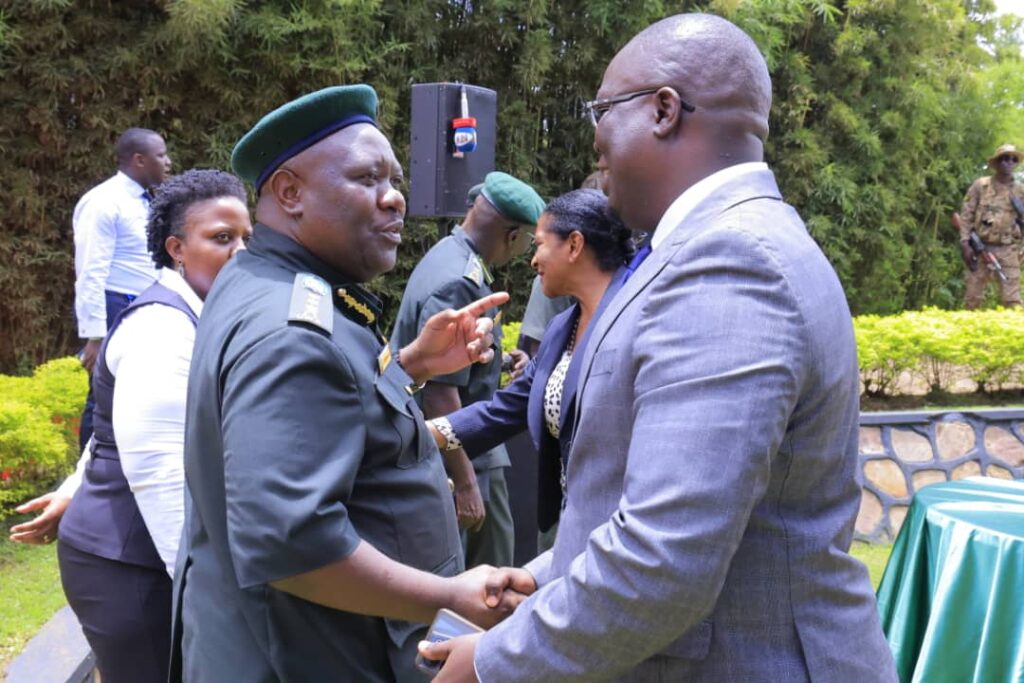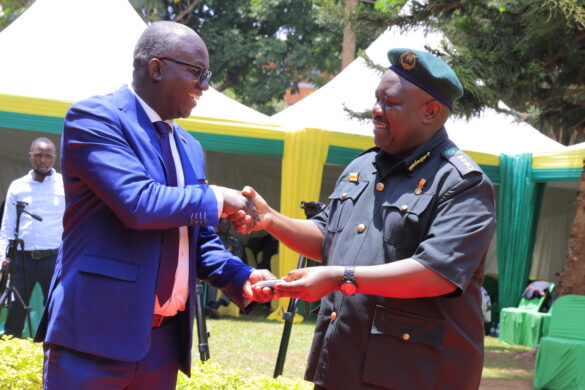On Friday, March 28, 2025, the tourism sector bid farewell to one of its most respected leaders, Sam John Mwandha, during a heartfelt retirement ceremony at the Serena Conference Centre.
Mwandha, who served as the Executive Director of Uganda Wildlife Authority (UWA) since 2018, was lauded for his exceptional leadership and unwavering commitment to the conservation and protection of Uganda’s wildlife resources.
Tourism Minister Martin Mugarra Bahinduka who presided over the farewell, commended Mwandha for his sterling service to UWA and the country.
Mugarra highlighted that Mwandha’s career trajectory, which saw him rise through the ranks of the organization, was marked by integrity and dedication.

He pointed out that, despite challenges faced during his tenure, including the effects of the COVID-19 pandemic on tourism, Mwandha’s leadership remained exemplary.
“Mwandha served diligently and with transparency, steering UWA through turbulent times while safeguarding its resources,” Mugarra said.
He went on to mention that had Mwandha requested an extension of his term, the political leadership would have gladly granted it, given his track record.
However, in a surprising move, Mwandha submitted a letter of retirement despite his clean record.
Minister Mugarra encouraged all government workers to emulate Mwandha’s exemplary leadership style.
He stressed the importance of preparing for retirement well in advance and not clinging to positions.
“Let us not wait until the last moment to think about retirement. As leaders, we must create opportunities for others to serve and contribute,” Mugarra urged.
Prof. James Kalema, the current Chairperson of the UWA board of trustees also praised Mwandha’s commitment, recounting his leadership during challenging periods, particularly during the COVID-19 pandemic when UWA faced financial constraints due to low visitor numbers.
Under Mwandha’s leadership, UWA not only survived but also made significant strides, including the merger of UWA and the Uganda Wildlife Education Centre (UWEC) and expanding UWA’s workforce by 800.
Additionally, Mwandha successfully doubled the organization’s budget, ensuring its sustainability.
During the 2017-2018 financial year, UWA had a budget of about Ush 86.8 billion shillings. Latest figures from the authority put its budget at over Ush 168 billion as of financial year 2023-2024.
In speech, Mwandha reflected on his journey from being appointed by then Minister Prof Ephraim Kamuntu.
He acknowledged the challenges he faced but emphasized the importance of teamwork in overcoming them.
He noted that his leadership was always grounded in transparency and open communication, ensuring that UWA’s financial resources were carefully managed and protected.
“I wasn’t alone in this journey,” Mwandha said, “I worked with a dedicated team, and together we tackled challenges head-on. We demystified rumors and worked hard to ensure the authority remained a trusted institution.”
He also made peace with those he may have disagreed with during his tenure, urging them to support the incoming ED, Dr. James Musinguzi, who officially took over on Wednesday this week.
Mwandha left his final message with the UWA team, calling them on to remain patriotic, truthful, and always seek divine guidance in their decision-making.
The official handover of office to Dr. James Musinguzi, the new Executive Director, was conducted on Wednesday, April 2, marking a new chapter for Uganda Wildlife Authority.
In an interview with this publication, Musinguzi listed an array of reforms, targets and new innovations he intends to bring on board to push the conservation authority to greater heights.
“First, we shall be working on consolidating the achievements and gains of the authority from over the years and then we can look at drawing a new strategic plan, product development to ensure that we increase income which then can be reinvested into conservation,” he said.
Others, he added, are running stake holder engagements, management and empowering of over 3,000 staff who he says have to feel a sense of ownership in the authority, and embracing advanced technology within the authority’s operations.
As he takes on the mantle in April, Musinguzi, whose immense love for biology drew him into wildlife conservation in his earlier years, will have to deal with a host of challenges that continue to bedevil the authority currently.
Among these are constant poaching in some of the country’s conservation areas that has threatened to deplete endangered species, human wildlife conflicts around parks, land conflicts between the authority and communities living around parks that has caused loss of lives, poor intelligence gathering and lack of innovation in conservation.
“One of the tenets of any leadership is bringing communities in these conservation areas to understand that the presence of the parks is a blessing to them and not a curse,” he said.
Currently, UWA runs a revenue sharing programme with communities around parks and also does invest in social and economic ventures like schools and startups.
This is one of the areas which Musinguzi says will be his key focus in making communities appreciate the importance of the parks they live around.
Others, he added, will be quick and fair compensation of victims of human-wildlife conflicts with help of a mobile application. He also promises to employ technology in the fight against poach, animal census, park surveillance among and payments among others.


